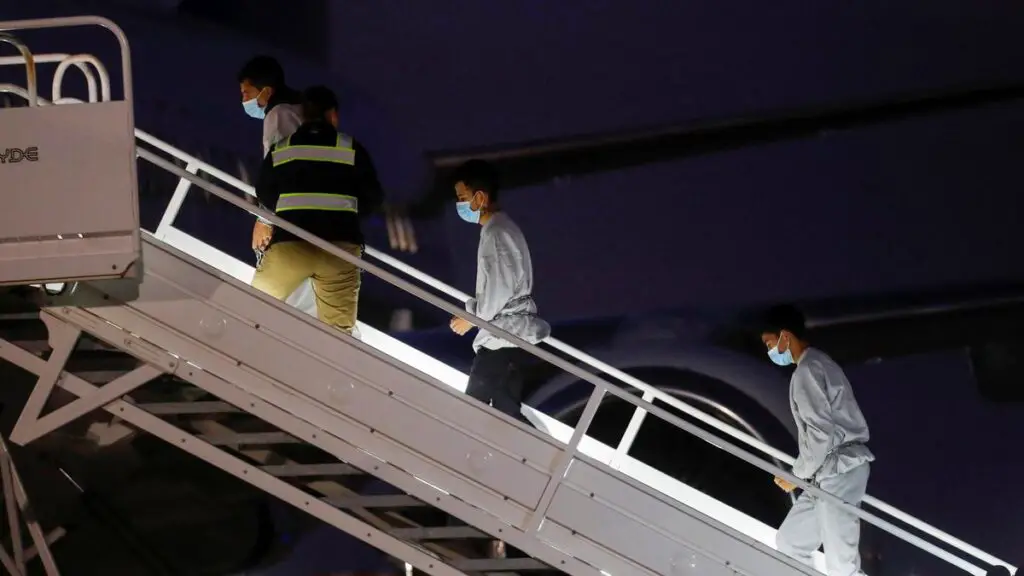Venezuelan migrants boarded a repatriation flight as part of the immigration enforcement process at Valley International Airport in Harlingen, Texas. On October 18, 2023, over a hundred migrants were deported back to their economically troubled country. This marks the first time in years that the U.S. has deported individuals to Venezuela, showing a significant concession by President Nicolás Maduro’s government to a long-time adversary.
The deportation process began with a Boeing 737 jet taking off from Harlingen, Texas, and making a stop in Miami before arriving in Caracas, the capital of Venezuela. Approximately 130 Venezuelan men and women were transported to the plane on buses while wearing restraints on their wrists and ankles. U.S. immigration officers conducted pat-down searches as they boarded the aircraft.
Deportation Flights to Venezuela
The Biden administration plans to carry out “multiple” deportation flights per week to Venezuela, according to a waiver on travel restrictions issued by the U.S. Transportation Department. This would make Venezuela one of the top international destinations for U.S. immigration authorities. The first flight took place the day after the Venezuelan government and opposition agreed to work on electoral conditions. As a result, the U.S. Department of Treasury announced some sanctions relief on Venezuela’s oil, gas, and gold mining sectors.
Venezuelan President Nicolás Maduro expressed his satisfaction with the repatriation of Venezuelans, stating that it was in compliance with the agreements reached between the Venezuelan authorities and the U.S. government. During televised remarks, Maduro also discussed the electoral conditions that will impact the country’s 2024 presidential election. State television broadcasted footage of migrants wearing face masks disembarking from the plane, undergoing health tests, and answering officials’ questions at the Caracas airport. Maduro’s government has attributed the migration issue to economic sanctions.
Deportation Priorities
Corey Price, an acting executive associate director for U.S. Immigration and Customs Enforcement, explained that the prioritized individuals for deportation flights include recent arrivals as well as migrants who have committed crimes in the United States. Border Patrol Chief Jason Owens mentioned that the passengers on the first flight had entered the U.S. illegally between ports of entry. Price further emphasized that there will be several more charter flights to Venezuela in the coming days and weeks.
Venezuela’s Ongoing Crisis
The deported migrants will face a homeland in the midst of a complex social, political, and economic crisis. Venezuela’s situation has deteriorated due to a global drop in oil prices, which is the country’s most valuable resource, coupled with mismanagement by the self-proclaimed socialist government. People are struggling with constant food price increases, business closures, and a monthly minimum wage of only $3.70, barely enough to purchase a gallon of water. Maduro’s government has vowed to provide resources to support the deported migrants.
Deportation Process and Its Impact
The U.S. government relies on a fleet of charter carriers called ICE Air for deportation flights. These flights, usually carrying 135 migrants, will depart from undisclosed airports in the United States to Venezuela, as stated by the Department of Homeland Security. They are intended for Venezuelans who have received final removal orders, either due to a failed asylum bid or the inability to seek humanitarian protection.
The deportation flights are a response to the increase in migration from Venezuela, which has strained immigration systems throughout the hemisphere, including the United States, according to the Transportation Department. The U.S. has faced challenges in deporting individuals to countries with strained diplomatic relations, such as Venezuela, Cuba, and Nicaragua. After more than two years, Cuba allowed the resumption of U.S. deportations in April, with flights to Cuba occurring approximately once a month.
The U.S. government hopes that the threat of deportation will deter Venezuelans from attempting to enter the country illegally. Instead, they encourage individuals to utilize the online appointment system for asylum claims or pursue legal paths. However, this strategy has not deterred many people from continuing to migrate.
Temporary Legal Status and Mexican Assistance
Venezuelan migration to the U.S. had declined when the Biden administration allowed Venezuelans to enter the country if they applied online with a financial sponsor who also arrived at the airport. Since October of last year, over 61,000 Venezuelans have entered the U.S. through this route.
Interestingly, just weeks after the Biden administration granted temporary legal status to hundreds of thousands of arriving Venezuelans, the deportation flights resumed. The temporary status offers easier access to work authorization and prevents deportation orders. Immigration attorneys are urging Venezuelans to apply for Temporary Protected Status (TPS) to avoid repatriation.
In contrast, Mexico agreed to accept some Venezuelans who were deported from the U.S. after crossing the border illegally, acknowledging that Venezuela would not do the same. However, the lull in migration was short-lived. In August alone, over 22,000 Venezuelans were arrested for illegally crossing the border, ranking fourth behind migrants from Mexico, Guatemala, and Honduras. Many Venezuelans head to major U.S. cities like New York and Chicago, overwhelming local shelters and temporary housing facilities.

